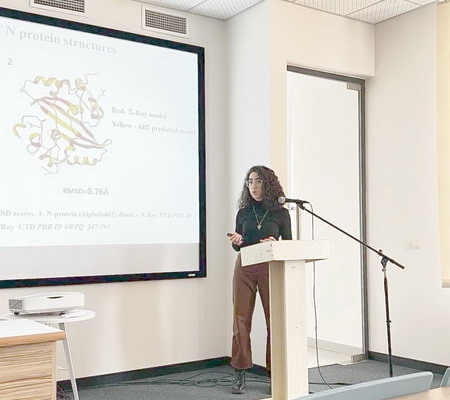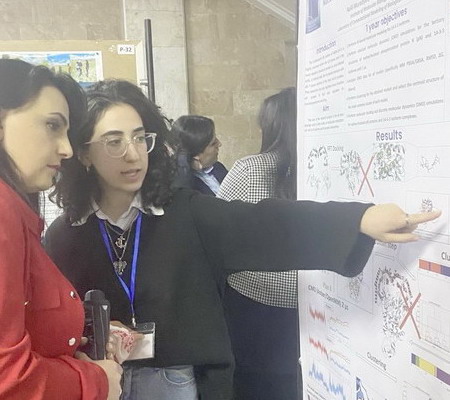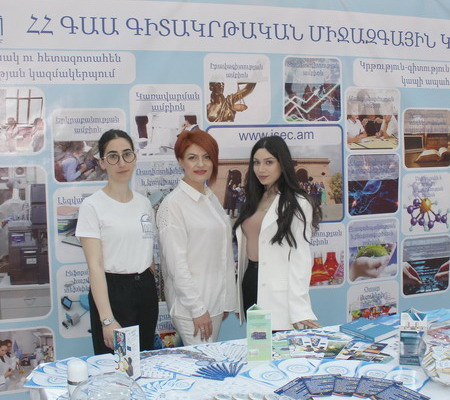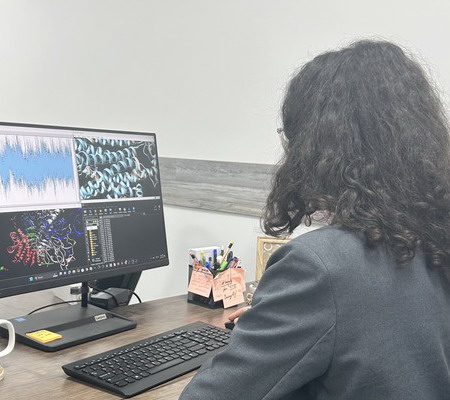"I have been Involved in Sequencing the Genome of the COVID-19 Virus in Parallel to My Studies," Nelly Muradyan, a PhD student of ISEC NAS RA
February 13, 2024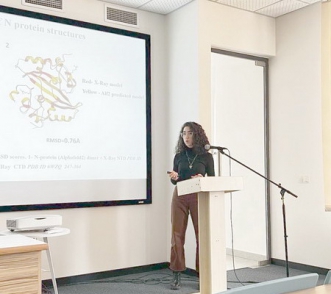
Nelly Muradyan is a postgraduate student of the Molecular and Cellular Biology Department of ISEC NAS RA. Nellie's passion for science and achievement in the scientific field contributed to her decision to enroll in a PhD program at ISEC. We had a talk with Nellie about her career choice, scientific research work and other aspects.
-What is the best way to sum up the years you spent studying for your Master's degree at Molecular and Cellular Biology Department of ISEC NAS RA?
-In a nutshell, it was rather knowledgeable. This was one of the wisest decisions I’ve ever made. I believe my best academic years were spent at the ISEC Department of Molecular and Cellular Biology. Observing your own personal growth and development each year, which actually started at ISEC, is the greatest feeling in the world. In this regard, my professors and, more recently, my colleagues were crucial. The fact that the classes were held at the Institute of Molecular Biology of NAS RA and that all of the professors were influential scientists who were always willing to assist, clarify, and teach anything was the most exciting aspect.
-What enabled you to pursue your studies further in the ISEC PhD program?
-Studying at the Master's degree already assumed that I wanted to be engaged in science, so the next logical step was to pursue my postgraduate studies. I've been a PhD student at the Institute of Molecular Biology for already two years.
-Where do you currently work, and what knowledge you have gained at ISEC is particularly applicable in your current position?
-I have been working at the NAS RA Institute of Molecular Biology since 2020. I started my scientific career in the laboratory of human genomics. A year or so later I moved to the laboratory of computer modeling of biological processes to carry out my Master's thesis research, and I still work here as a junior researcher. Our lab specializes in computational biology, or structural bioinformatics, and all the experiments are run entirely through computer simulations and calculations.
I find it difficult to single out any particular knowledge when working in science, since you constantly acquire new skills, which you then gradually add to and filter deeper with new ones based on the specifics of your work.
-What is the subject matter of your scientific research, and what issue are you attempting to solve?
-My research focuses on the “in silico” screening and “de novo” design of interaction modulators between the 14-3-3 isoforms and the SARS-CoV-2 nucleocapsid protein. The SARS-CoV-2 virus, which is the cause of the COVID-19 pandemic, has played a significant role in my scientific journey thus far, beginning with my Master's program selection. In parallel to my studies, I worked at the Institute where was involved in the sequencing of the virus genome. My Master's thesis revealed the structure and effects of mutations in the nucleocapsid protein, which is a crucial component of the virus. Currently I'm researching the interaction between the so-called 14-3-3 protein and the nucleocapsid protein in virus-infected cells. Our primary objective is to identify small molecules, such as chemical compounds or peptides, that will obstruct the nucleocapsid 14-3-3 protein interaction, preventing their complex formation. Furthermore, it's critical to disrupt their interaction in order to reduce the virus's infectiousness. All of the work is done "in silico," or via extremely intricate computer calculations. Our accurate results are a direct consequence of the algorithms that are used to calculate physical, chemical, and biological parameters. Globally, the scientific work is aimed to discover compounds, but until then, we have been studying the structure of the nucleocapsid and 14-3-3 protein complex for about 2 years; in this case, it is crucial to obtain the right protein complex in order to carry out further research. More than 1200 protein models were simulated to begin the process. Following extensive validation and screening phases, we chose the top two and carried out additional research with their application.
-What scientific endeavors do you have planned for the near future?
-I am currently working on two grant projects, one of which is called "Program for supporting research activities of young applicants and graduate students - 2022." I plan to complete these programs first and foremost, and to defend my PhD thesis afterwards. In a rather fascinating scientific paper that is currently in the printing stage, we examined 37 different nucleocapsid protein mutations and demonstrated the effects they had on the stability and structure of the viral protein. As a side project during my Master's thesis, I conducted all of the experiments while I was still enrolled in my Master's degree program.
ISEC NAS RA Department of Public Relations and Career

